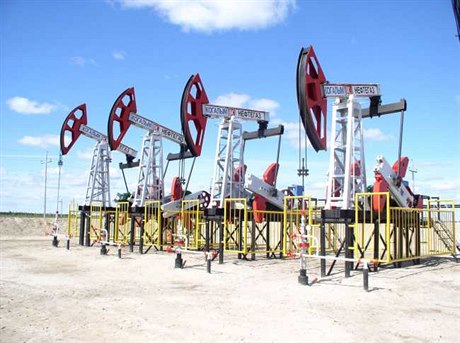Oil production in Russia could go down sharply in the coming years. Due to a persistently heavy tax burden, it may not pay off to complete oil extraction from current oil fields while exploration of new oil fields has also become unprofitable. Unless the tax burden is reduced, oil production in Russia will drop to less than one-third of the present level by 2020 and will practically cease by 2030.
This has emerged from an analytical document called Plan for the Development of the Oil Sector in the Russian Federation up until 2020, which was discussed by Prime Minister Vladimir Putin’s Cabinet in October 2010 and published by Neft i Kapital magazine in November 2010. The document is based on an analysis of data provided by 227 companies extracting oil on Russian territory.
“Although it is clear the Russian government is aware of the dangers of a rapid wind down in oil production and is prepared to do something about it, it is by no means clear whether it will be successful. Tax revenues from oil production represent 40 percent of the Russian Federation’s overall budget revenues,” Pavel Švarc, in charge of Russian oil operations at KKCG, told Czech Position.
“Lowering these revenues as a way to stimulate oil production would cause the Russian government difficulties. It would have to find something else to compensate for the resulting shortfall,” he said. ‘Tax revenues from oil production represent 40 percent of the Russian Federation’s overall budget revenues’
If the current taxation level is maintained oil production will, according to the analytical document, go down from the current 496 million tons to 150 million tons in 2020 and to 50 million in 2030, which would in effect constitute a wind down of oil production in Russia. If the tax burden were to be reduced by 7 percent the drop in production would not be so severe, but still the total volume of production would decrease to 388 million tons in 2020 and to 228 million tons in 2030.
Both scenarios are unacceptable to Putin, who is quite aware of the significance of oil and natural gas with regard to international political relations where he is exploiting these energy resources to the full to wield influence. At the October Cabinet meeting he set down a strategy aimed at stabilizing oil production to a level of 505 million tons by 2020, conceding this would require an adjustment of taxation levels. By the middle of next year adaptations to the taxation regime, to remain in force until 2012, should be formulated.
The Kremlin needs to prevent a drop in oil production with a view to a previous decision it made regarding the construction of new oil pipelines by state-owned company Transneft.
Negative cash flow
The Russian analytical document points out that owing to the heavy tax burden and negative cash flow oil fields that have not yet been fully exploited are being closed down earlier than is necessary. On top of this, drilling in new oil fields has failed to commence in cases where it proved impossible to secure positive cash flow.
“For investors this analysis can have a double meaning — either it prompts them to invest with some sort of speculative outlook of improved future returns or it will make them bide their time until the moment the tax measures are implemented,” KKCG’s Švarc said.
Preparations preceding exploitation are another unresolved issue. The document warns that the knowledge base regarding oil reserves is in a critical state. The projected size of exploratory drilling for the 2010–20 period is 6.8 million meters, while in 1988 alone 7.6 million meters of seismic survey drilling was carried out. This implies that there was more exploratory drilling in 1988 than is planned for the entire coming decade.
The volume of seismic exploration planned for 2020 will be eight times lower as compared to 2010. According to the available data, 70 percent of all seismic surveys planned until 2020 are to be conducted by Rosneft, which means that the future of the entire sector depends on one single company.
A wind-down of oil production in Russia would also have negative implications for the Czech Republic and many other countries. Some 13 percent of last year’s world oil production totalling 3.821 billion tons was extracted in Russia from where the black gold flows to Poland, Germany, Slovakia, Hungary and the Czech Republic using just the Druzhba oil pipeline.





